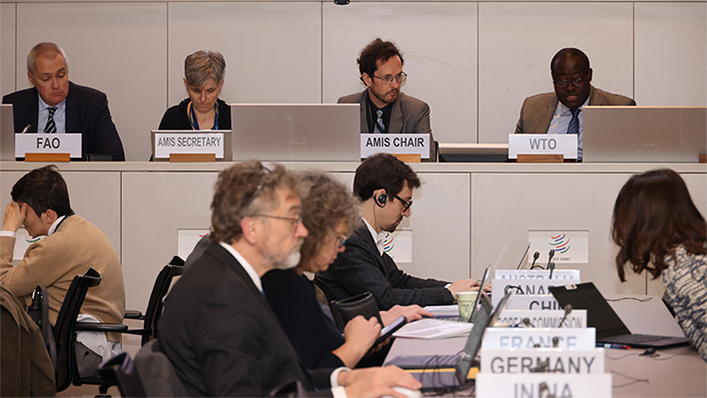
AMIS, an inter-agency platform launched in 2011 by G20 agriculture ministers, aims to improve food market transparency and policy responses to food insecurity. It includes G20 members along with Spain and eight other major agricultural exporting and importing countries, representing around 80-90% of global production, consumption and trade volumes of crops like wheat, maize, rice and soybeans.
Edwini Kessie, Director of the WTO’s Agriculture and Commodities Division, opened the meeting by underscoring the important role that AMIS plays. “In a more volatile market and policy environment, stable and predictable trade is more important than ever before,” he said.
Mr Kessie highlighted recognition of AMIS in the landmark 2022 WTO declaration on food security, in which WTO members also underscored the importance of promptly sharing information about policies that may impact food and agriculture markets.
He noted that the WTO supports AMIS through its regular policy monitoring, working closely with the Organisation for Economic Cooperation and Development (OECD) and other AMIS Secretariat members. The WTO also collaborates with the International Grains Council (IGC) on a wheat maritime trade database, providing real-time data and analysis on this important commodity.
in April, WTO members adopted a report on trade and food security, following work initiated by the food security declaration, Mr. Kessie said. The report invited the AMIS Secretariat to explore stronger links with regional economic institutions to gather, analyse and share timely and reliable food market data.
Despite the lack of specific negotiating outcomes on agriculture at the 13th Ministerial Conference, the WTO Secretariat is continuing to support members in their efforts to improve the functioning and long-term resilience of global markets for food and agriculture, he said.
The Chair of AMIS, Donald Boucher (Canada), told the meeting that the platform’s work was now well recognized by governments and market actors.
“It was heartening to see G-20 agriculture ministers recognise the ‘invaluable’ role of AMIS in providing robust, reliable and transparent market analyses of staple commodities, vegetable oils and fertilizers,” he said. He also encouraged countries and international agencies to continue contributing to AMIS work.
Dominique Bourgeon of the UN Food and Agriculture Organization (FAO) said: “AMIS has been playing a valuable role by providing timely and credible assessments of supply and demand dynamics; reducing information asymmetry; promoting policy coordination and responses; and providing a platform for dialogue.” The FAO hosts the AMIS Secretariat at its headquarters in Rome.
Over the course of the two-day meeting, participants presented updates on developments on global food markets and their underlying drivers as well as related research and analysis.
More information about AMIS is available here.
Subscribe to “News Harvest”, the WTO’s monthly food and farm policy trade news round-up.
Share
Reach us to explore global export and import deals